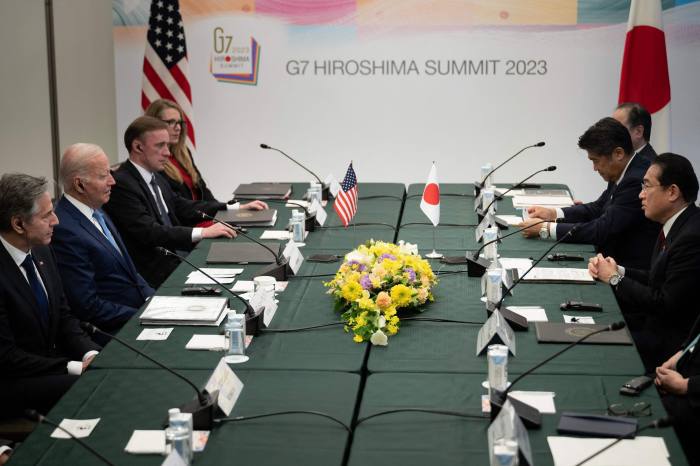
“The steering committee of the free world” is how Jake Sullivan, President Biden’s national security adviser, describes the G7.
And that description underlines the importance of the G7 summit that will take place in Hiroshima. The Ukraine war is still raging and may be reaching a crucial stage. Meanwhile, tensions continue to rise between China and the US. America is keen to co-ordinate with its democratic allies — such as Japan, the conference host — on both issues.
All summit communiqués strive to give an impression of unity and firmness. But commentators will be examining the text from this G7 summit (and the closing press conferences) particularly closely. Comments made by the French president, Emmanuel Macron, after his recent visit to China suggested that he, at least, felt that the fate of Taiwan is not a core concern for Europe. This comment jarred in Washington and in much of Europe. It also alarmed the Japanese government, which is keen to see more European involvement in East Asian security issues.
So it will be important to see if the G7 can muster a convincing display of unity on both China and Russia. Observers will also want to see if that unity extends beyond rhetoric into new and concrete initiatives — for example, on the securing of critical minerals or the “friendshoring” of supply chains.
Sullivan’s phrase — “the steering committee of the free world” — tells its own story about the strategic thinking underpinning the summit. The use of the phrase “free world” is redolent of the cold war and accurately conveys the mood in Washington. As in the cold war, the US is rallying democratic allies in Europe and Asia for a generational struggle against adversaries that are familiar from the first cold war: Russia and China.
The difference is that, this time, the order of precedence is clearly reversed. In the period from 1945-89, it was the Soviet Union that was America’s main adversary. This time, despite the Russian invasion of Ukraine, there is little doubt that China is seen as the more serious long-term rival by the US.
The American emphasis on the G7 — as opposed to the broader-based G20, which will have its own summit in Delhi in September — is also telling. It marks the transition from a period of world affairs dominated by economics and globalisation to a new era, in which politics and strategic rivalries set the tone.
The G20 came into its own in 2008. After the global financial crisis, it became apparent that the old G7 — of the US, Japan, France, Germany, Italy, Canada and the UK — was too narrow a grouping to stabilise the world economy. The growth of new centres of economic power — in particular China and India — made it imperative to involve a broader group of countries.
At the G20 summit in Pittsburgh in 2009, which I attended, the corridor chat was that the G7 was swiftly losing relevance — and might never meet again. But Russia’s full-scale invasion of Ukraine in 2022 — combined with China’s increasingly assertive foreign policy and growing domestic authoritarianism — has made the US and some of its allies increasingly sceptical of the usefulness of the G20. Russia and China are both members of the G20. And other key players — such as Brazil, India and South Africa — have remained studiously neutral over Ukraine.
As a result, a revived G7 looked like a more useful and focused grouping to deal with an era of renewed superpower rivalry. One senior European diplomat says the G7 is now “the workhorse of western co-operation” — with a shared focus on defending a “free and open international order”. In an effort to give the organisation a wider global influence, there will also be several guests at this year’s G7 summit — representing the African Union, India, Australia, South Korea, Brazil, Vietnam and the Pacific Islands.
The location of this year’s G7 summit is significant. Of all the G7 nations, Japan is probably the closest to the US in its perception of a threat from China. Geographical proximity, a festering territorial dispute with Beijing and the bitter legacy of history, makes Japan inclined to take the potential threat from China very seriously. Tokyo has also recently announced a major increase in defence spending.
But Japan also has its own distinctive pacifist tradition — derived from the horrors of the second world war. The fact that the summit will be held in Hiroshima — the site of the first ever use of an atomic bomb and the home constituency of Fumio Kishida, the Japanese prime minister — will be used to highlight a strong anti-nuclear and anti-war message. Combining this with a hawkish message of deterrence towards China will tax the skills of the assembled diplomats.
The Japanese hosts will have to walk a similar tightrope on economic issues — which were the core concern of the original G7 summits in the 1970s. The idea of an economic decoupling with China alarms many in the Japanese business community — for whom China remains a crucial and growing market. The German establishment has similar reservations.
In an effort to forge a common approach, the US and the EU have begun to use similar language — with an emphasis on “de-risking” business with China, rather than outright decoupling.
Yet this linguistic change only goes so far. Defining the risk of doing business with China — and working out sensible hedges against those risks — will be a core concern for the G7 summit.
Stay connected with us on social media platform for instant update click here to join our Twitter, & Facebook
We are now on Telegram. Click here to join our channel (@TechiUpdate) and stay updated with the latest Technology headlines.
For all the latest Business News Click Here
For the latest news and updates, follow us on Google News.

